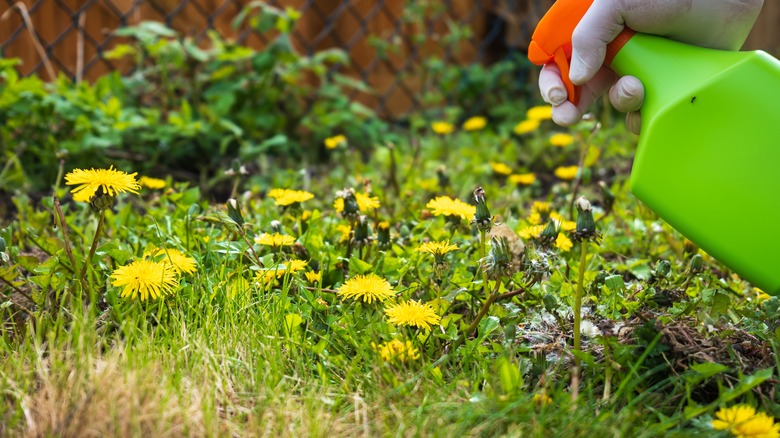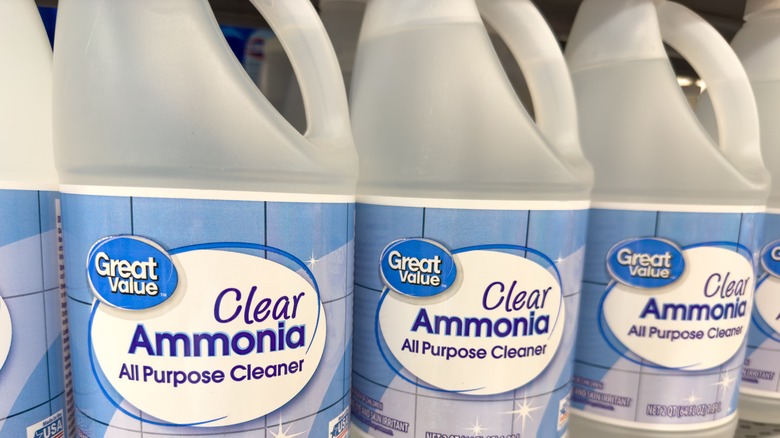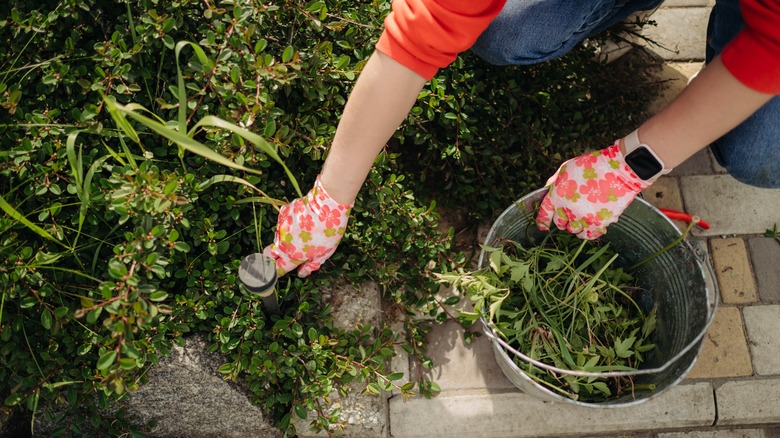Why You Shouldn't Use Ammonia To Kill Weeds (& Better Alternatives To Try)
From spraying hydrogen peroxide on your lawn for fleas to using common kitchen ingredients to tackle weeds, the internet is full of home remedies that promise to keep your garden healthy and vibrant. While some of them actually do live up to their promise, not everything under your kitchen sink is safe to use in your garden. That includes ammonia. Touted by some as an easy DIY alternative to store-bought herbicides, household ammonia cleaners shouldn't be used as a weed killer. While it might kill the weeds, it can also harm the plants nearby that you want to keep.
Plants aside, the corrosive chemical can also be dangerous to use for humans and wildlife, especially aquatic animals. If you're not careful, mishandling ammonia can cause skin burns, eye damage, and respiratory irritation. Fortunately, you don't have to turn to ammonia to control the weeds in your garden. There are plenty of safer methods, ranging from hand pulling to using solarization to clear out larger areas of your yard that have been overrun by weeds.
Ammonia is unhealthy, unsafe, and unpredictable
Ammonia is a common ingredient in fertilizer and you'll often find ammonium-based compounds in herbicides and fungicides. But neither of these are interchangeable with the bottle of ammonia you might have in your laundry room or stashed under your kitchen sink. The common household cleaner is typically made of ammonia dissolved in water. When dissolved like this, it creates aqueous ammonia, a compound that is toxic to plants. In that sense, yes, ammonia can effectively kill weeds. However, the chemical can be hard to control. For example, environmental factors like higher temperatures, higher pH levels in soils, or even alkaline water can increase the toxicity of ammonia. So, what you thought was a mild dose could easily reach severely toxic levels that harms the plants, insects, and other wildlife exposed to it.
Another reason it can be hard to control is that ammonia is actually a gas. That's what allows it to evaporate quickly and leave a streak-free shine on glass and countertops. But in the garden, the more ammonia you lose to evaporation, the harder it is to ensure you're applying a uniform dose of the stuff to the weeds you're trying to kill. You could easily end up overdoing it in one area and completely missing others. Moreover, inhaling that evaporated ammonia can be harmful to your health. If you've already been using it in your garden, you should stop using ammonia immediately and switch to safer methods of weed control.
Safer alternatives for getting rid of weeds
If you're looking to get rid of weeds, there are plenty of ways to do it without using toxic ammonia. The most tried and true method is hand pulling. It's up to 100% effective at weed control and harmless to any nearby plants. It also doesn't add any potentially toxic chemicals to your soil. While it might seem tedious, spending a little time each week pulling weeds goes a long way toward preventing them from taking over. For larger areas that have been completely overrun with weeds, you can also try solarization. This involves laying a clear tarp or plastic sheet over the weedy area and leaving it there for a few weeks or months during the summer. The soil underneath the tarp heats up and causes seeds to germinate, then the tarp blocks rainwater, ultimately scorching the weeds. Solarization is a slow process, but also relatively effortless. It not only kills the weeds you can see on the surface, but also the bank of weed seeds hidden in that soil.
Finally, if you must turn to chemical means, you can try targeted herbicides to help eradicate weeds without the same risks that come with ammonia. Just be sure you pick something that targets the species you're dealing with and, ideally, doesn't harm the species you want to keep. If the weed is too similar to your wanted plants, use a more selective application method to avoid contact with plants you don't want to kill. For example, instead of broad spraying, squirt or wipe the herbicide directly onto target plants.


